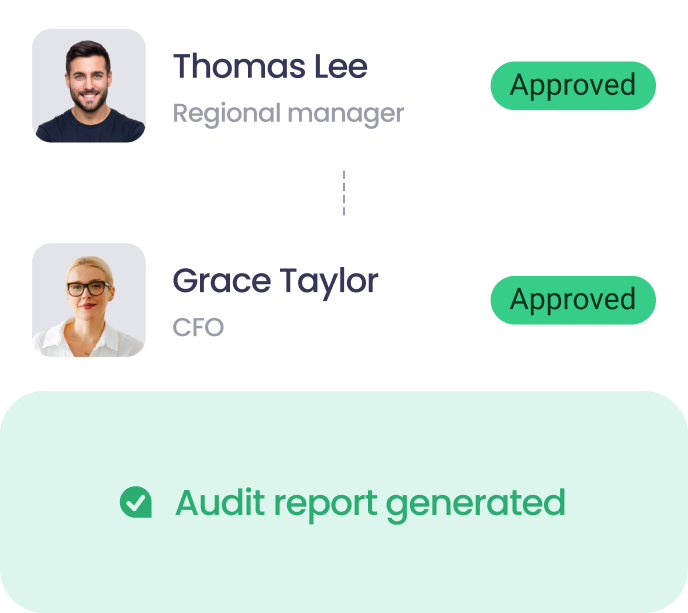
Dispelling the top three myths about financial controls and approvals
Are your clients being held back by misconceptions about the benefits of approval automation? We delve into three common myths and share advice on how to help your clients build a more robust and efficient finance function that is fraud-resistant, audit-ready, and streamlined for maximum efficiency.

Having the right financial controls and approval processes in place makes a world of difference, but many widely held misconceptions still pervade. We sat down with our Head of Accounting APAC and founder of Next Dimension Accounting Brendan Lucas, to discuss some of the most common myths around financial controls, cash flow, and approvals – and how to identify and address them with clients to keep their business secure and efficient.
Myth #1: "Business owners need to personally approve every payment to stay in control."
This mindset can often lead to business owners feeling burnt out and creating payment bottlenecks along the way. While it’s understandable that your clients want to manage all their approvals, once they start building a team, it’s crucial to encourage them to involve team members in the approval process to maintain efficiency and prevent decision-making delays.
Business owners can stay across everything while delegating approvals to managers using tools like ApprovalMax. This set up not only speeds up processes, but also gives managers visibility over their tasks for more accountability. When business owners insist on controlling everything, managers are often left in the dark, which affects team efficiency and growth.
Instead of trying to approve everything on their own, tell your clients that they can set up a delegation of authority policy. This defines who has the authority to make decisions, approve transactions, or take specific actions on behalf of the organisation.
Here’s an example:
- Managers can approve expenses up to £5,000, but anything above requires executive sign-off
- A Head of Finance can authorise payments over £50,000 – £100,000
- A CEO or business owner can approve expenses beyond £100,000
Myth #2: "Handling a high volume of bills makes approvals and payments complicated, so it’s easier to let a finance manager take care of it all."
Don't let your clients fall into this trap. They may be willing to trust their finance manager as the sole signatory on all approvals and payments because it’s convenient, but it opens the door to huge risks. From scams to internal fraud, stories of financial woes often trace back to a lack of checks and balances by more than one person. Would you hand someone your physical cash with no safeguards? The same caution should apply to your paperless approvals.
Brendan insists on talking to your clients about segregation of duties – that tasks should be split among multiple people so that one person cannot initiate, approve, and execute a transaction alone. No matter how much your client trusts their team, relationships can quickly change over time, and trust gone wrong can leave your client’s business vulnerable. Take this example from Brendan, with three different people:
- The NDA team processes the bill
- The Business Unit Manager approves the bill
- Finally, the owner approves the payment
Myth #3: "Setting up a new system for approval automation will be too difficult, and training people will take too long."
Long-standing processes can often be difficult to change, especially if your client’s business has operated without issues in the past. Your client may be resistant and say that using approval automation software is an added expense.
The reality is that approval automation doesn’t take a long time to set up or learn. You can explain to your client that over time, automation saves time and money. The time spent on manual approval processes – like running around to collect paper signatures, sending endless emails to chase approvers, or updating spreadsheets – is inefficient and the wasted hours add up each week.
Once your client understands that setting up approval automation and training staff isn't as daunting as it seems, you’ll want to explain that their outdated manual processes are costing them more time and money in the long run. With approval automation, they'll start seeing time and cost savings in just days or weeks.
Real-world impacts of not using approval automation
Brendan shared an example of a client before they started using ApprovalMax. The CEO had to spend an hour every week manually approving bills. This was not a great use of the CEO’s time, and this could have been better spent on business growth. By including their management team in the approval process and having a delegation of authority policy, they significantly improved their workflow and freed up valuable time.
While financial controls might seem unnecessary when many of your clients are used to manual processes, they act as vital safeguards when issues arise. Your client may not notice the difference or importance of switching to an automated process until they get a chance to see that a tool like ApprovalMax is capable of taking over multiple tasks at once – that’s when the true value becomes clear.
How to educate and help business owners
Brendan says that as an accountant, you can share real-life examples of financial controls, such as how to avoid scams or prevent mistakes caused by a lack of oversight. This helps clients understand why strong processes are important and how the right tools can protect them.
Trust is important when it comes to company finances, but it needs safeguards and policies in place for protection and safety. If your client falls for a scam and money is lost, it can impact the business’ reputation, leave them in financial ruin, and emotionally impact them. Effective financial controls and approval processes don’t slow down business – they protect its future.
By debunking these three common myths and using approval automation, you can advise your clients to build a more robust and efficient finance function that is fraud-resistant, audit-ready, and streamlined for maximum efficiency.
Ready to simplify your approval process?
Approvalmax is an all-in-one B2B software platform used by businesses around the world to build robust AP and AR automation, creating multiple layers of internal control. It streamlines the approval process by allowing users to create automated workflows to approve bills and invoices. ApprovalMax integrates with accounting platforms such as Xero, QuickBooks Online, and Oracle NetSuite to unlock powerful efficiencies for accounts payable and accounts receivable functions in any finance team.
Set up a system of checks and balances for your financial operations.
Multi-step, multi-role approval workflows for financial documents.

Auto-generated audit reports for each approved item.

Get alerts for fraudulent activity and protect against it happening.
Leave printing in the past with fully digitised workflows.



